 W
WAction 52 is an unlicensed, multicart video game compilation developed by Active Enterprises for the Nintendo Entertainment System, and by FarSight Technologies for the Sega Genesis. The NES version was released in 1991, followed by the Genesis version in 1993. Active Enterprises was legally incorporated in the Bahamas, but the company's offices and development were located in Miami, Florida. Its warehouse was located in Orlando, Florida.
 W
WAirborne Ranger is an action game developed and published by MicroProse for the Amstrad CPC, Commodore 64, ZX Spectrum, and DOS in 1987, and ported to the Amiga and Atari ST by Imagitec Design in 1989. In the game, a sole U.S. Army Ranger is sent to infiltrate the enemy territory to complete various objectives. The game was followed by Special Forces in 1991.
 W
WAlbert Odyssey: Legend of Eldean is a role-playing video game produced by Sunsoft for the Sega Saturn. It was originally made for the Super NES, and ported to the Saturn late in its development. Released in Japan in August 1996, the game was made available in North America in July 1997 by Working Designs.
 W
WAsuka 120% BURNING Fest. is a Japanese bishōjo fighting game series produced by Fill-in-Cafe that was published and distributed by FamilySoft and Kodansha. It is set in a school where members of school clubs fight each other in a fighting tournament. Masatoshi Imaizumi led development, and artwork provided by manga artist Aoi Nanase.
 W
WBaby's Day Out is a 1994 American comedy film directed by Patrick Read Johnson and written by John Hughes, who also produced the film. Starring Joe Mantegna, Lara Flynn Boyle, Joe Pantoliano, and Brian Haley, the plot centers on a wealthy baby's abduction by three criminals, his subsequent escape and adventure through Chicago while being pursued by the criminals.
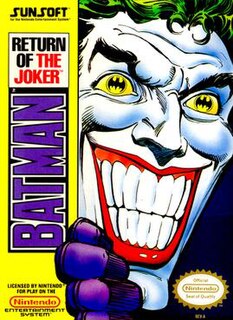 W
WBatman: Return of the Joker is a 1991 platform video game, the follow-up to Sunsoft's first Batman game on the Nintendo Entertainment System. Unlike that game, which was based on the 1989 Batman film directed by Tim Burton, Return of the Joker is entirely self-contained and based more on the modern comic book iteration of Batman. However, Batman rides the Batmobile and the Batwing from the 1989 film. A remake of Return of the Joker, titled Batman: Revenge of the Joker, was released on the Sega Genesis by Ringler Studios in 1992. A Super NES version of Revenge of the Joker was completed but never officially released; however, a ROM file surfaced online in later years, and it can only be played on an emulator.
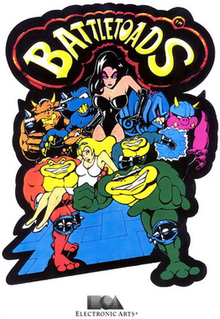 W
WBattletoads Arcade, also known as Super Battletoads or just Battletoads, is a 1994 scrolling beat 'em up arcade game in the Battletoads series developed by Rare and published by Electronic Arts. Up to three players, as the Battletoads, brawl aliens and mutant rodents through six levels to save the universe from the Dark Queen. The game also includes vertical and bonus levels. Each Toad has its own signature attack, and as customary for the series, players can knock enemies towards the screen, breaking the fourth wall.
 W
WBill's Tomato Game is a puzzle game for the Atari ST and Amiga designed by Bill Pullan and published by Psygnosis in 1992. The artwork is by Lee Carus-Westcott and the music by Mike Clarke.
 W
WBlood Bros. is a 1990 arcade game developed and published by TAD Corporation in Japan and Europe, while it was later published in North America by Fabtek. It is a spiritual sequel to Cabal, with almost identical mechanics. A bootleg of this game is known as West Story.
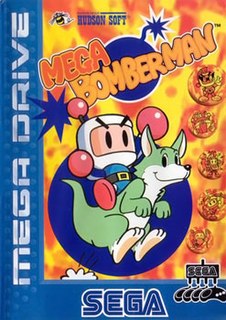 W
WBomberman '94 is a video game from the Bomberman series which was developed and published by Hudson Soft for the PC Engine and released on December 10, 1993 in Japan. It was later re-developed by Westone and re-published by Sega as Mega Bomberman on the Sega Mega Drive/Genesis in 1994 in other areas. The PC Engine Bomberman '94 was later released outside Japan through the Wii's Virtual Console and the PlayStation 3's PlayStation Network.
 W
WBrutal Sports Football is an arcade-style football video game developed by Teque London and originally published by Millennium Interactive for the Commodore Amiga in 1993. It is the first entry in the Brutal Sports Series franchise, which continued with Wild Cup Soccer in 1994, also from the same development team.
 W
WComanche is a series of simulation games published by NovaLogic, later THQ Nordic after their acquisition. The goal of each of these games is to fly military missions in a RAH-66 Comanche attack helicopter, which was in development and prototyping at the time of release.
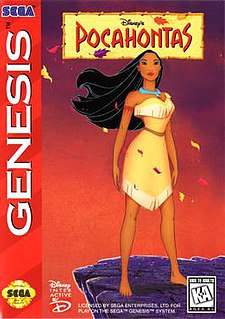 W
WDisney's Pocahontas is a platform game based on the 1995 film of the same name. The Sega Genesis/Mega Drive version was developed by Funcom on contract with Disney and was released on January 1, 1996. It was followed by a later version for the Game Boy developed by Tiertex Design Studios and released on June 10, 1996, nearly a year after the film's premiere. A Super Nintendo Entertainment System version of the game was under development around the same time as the Mega Drive/Genesis version, but was canceled due to development being too far behind to coincide with the Mega Drive/Genesis release.
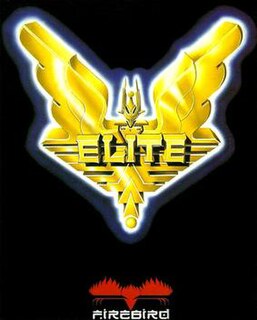 W
WElite is a space trading video game. It was written and developed by David Braben and Ian Bell and originally published by Acornsoft for the BBC Micro and Acorn Electron computers in September 1984. Elite's open-ended game model and revolutionary 3D graphics led to it being ported to virtually every contemporary home computer system and earned it a place as a classic and a genre maker in gaming history. The game's title derives from one of the player's goals of raising their combat rating to the exalted heights of "Elite".
 W
WFalcon is a combat flight simulator video game and the first official entry in the Falcon series of the F-16 jet fighter's simulators by Spectrum HoloByte. Originally developed by Sphere for Macintosh and MS-DOS in 1987 and ported to several platforms between 1988 and 1992, the game earned commercial success and critical acclaim.
 W
WFinal Fantasy VII is a 1997 role-playing video game developed by Square for the PlayStation console. It is the seventh main installment in the Final Fantasy series. Published in Japan by Square, it was released in other regions by Sony Computer Entertainment and is the first in the main series with a PAL release. The game's story follows Cloud Strife, a mercenary who joins an eco-terrorist organization to stop a world-controlling megacorporation from using the planet's life essence as an energy source. Events send Cloud and his allies in pursuit of Sephiroth, a former member of the organization who seeks to harm the planet. During the journey, Cloud builds close friendships with his party members, including Aerith Gainsborough, who holds the secret to saving their world.
 W
WGargoyles is a platform game developed by Disney Software and published by Buena Vista Interactive for the Sega Genesis in 1995. It is an adaptation of the Disney animated series of the same title.
 W
WGearheads is a strategy video game developed by R/GA Interactive and Philips Media, and published by Philips Media for Microsoft Windows and Mac OS in June 1996. The player deploys wind-up toys to get them across an arena while attempting to prevent toys from crossing from the other side. Players can play against the computer or another player. Single, customisable games can be played, or the player can play a series of games with set rules and a limited number of lives in a tournament.
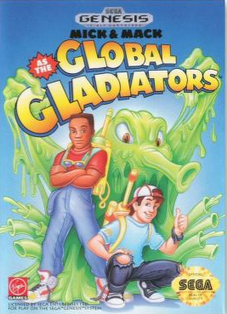 W
WGlobal Gladiators is a 1992 platform game published and developed by Virgin Games, originally programmed by David Perry for the Mega Drive/Genesis and eventually ported by other Virgin Games teams in Europe to the Master System, Game Gear and the Amiga. A Super NES and an NES port were also in development but were never completed for undisclosed reasons, though a ROM image has since surfaced. The game is based on the McDonald's fast food chain and has a strong environmentalist message.
 W
WGordo 106 is a 1993 platform video game developed by Tenth Planet Software and published by Atari Corporation in North America and Europe exclusively for the Atari Lynx. Set in the installations of N. Human Laboratories, players assume the role of an exploited laboratory monkey named Gordo, who unintentionally gained intelligence as a result of experimentation with radiation in order to free other animal test subjects and escape from the building, while defeating scientists and employees of the complex along the way. Its gameplay consists of platforming and exploration with a main three-button configuration.
 W
WIn the Hunt is a 1993 scrolling shooter arcade game developed and published by Irem. Versions for the PlayStation, Sega Saturn and PC were also released. The player assumes control of the Granvia, a submarine tasked with overthrowing the Dark Anarchy Society before they activate their doomsday device. Gameplay involves shooting enemies, collecting power-up items, and avoiding collision with projectiles. It ran on the Irem M-92 hardware.
 W
WKiller Instinct 2 is a fighting video game developed by Rare and manufactured by Midway for arcades in 1996 as a sequel to Killer Instinct (1994). A modified version of Killer Instinct 2, licensed by Nintendo, was published for the Nintendo 64 as Killer Instinct Gold that same year. A Super Nintendo Entertainment System version of Killer Instinct 2 was developed and completed, but never released. A digital port of the game for Xbox One is bundled with the second season of Killer Instinct (2013) under the title Killer Instinct 2 Classic.
 W
WMetal Gear 2: Solid Snake is an overhead action-adventure stealth video game released by Konami for the MSX2 computer platform in 1990. It serves as a direct sequel to the MSX2 version of the original Metal Gear, written and designed by series's creator Hideo Kojima, who conceived the game in response to Snake's Revenge, a separately-produced sequel that was being developed at the time for the NES specifically for the North American and European markets. The MSX2 version of Metal Gear 2 was only released in Japan, although Kojima would later direct another sequel titled Metal Gear Solid, which was released worldwide for the PlayStation in 1998 to critical acclaim. This later led to Metal Gear 2 being re-released alongside the original Metal Gear as additional content in the Subsistence version of Metal Gear Solid 3 for the PlayStation 2 in 2005. It was also included in the HD remastered ports of Metal Gear Solid 3 released for PlayStation 3, Xbox 360 and PlayStation Vita and was given a stand-alone re-release in Japan as a downloadable game for mobile phones and the Wii Virtual Console.
 W
WMission: Impossible is an action-adventure video game developed by Infogrames and loosely based on the 1996 film of the same name. It was originally released for the Nintendo 64 video game console in 1998. In the game, the player assumes the role of Ethan Hunt, an Impossible Missions Force (IMF) agent who must clear his name after a mole has infiltrated the IMF team. The game features 20 levels where the player must complete several mission objectives with the use of numerous high-tech gadgets.
 W
WMortal Kombat Trilogy is a fighting game released by Midway in 1996 as the second update to Mortal Kombat 3 for the PlayStation, Nintendo 64, Sega Saturn and PCs. Further versions were also released for the Game.com and R-Zone. It features a similar basic gameplay system and the same story as Ultimate Mortal Kombat 3, but adds characters and stages restored from Mortal Kombat and Mortal Kombat II. New additions to the game included the "Aggressor" bar, and a new finishing move called Brutality, a long combination of attacks that ends with the opponent exploding. The game was met with mixed reviews upon release.
 W
WMother 3 is a role-playing video game developed by Brownie Brown and HAL Laboratory and published by Nintendo for the Game Boy Advance. The final entry in the Mother series, it was released in Japan on April 20, 2006. The game follows Lucas, a young boy with psychic abilities, and a party of characters as they attempt to prevent a mysterious invading army from corrupting and destroying the world.
 W
WNetwork Q RAC Rally is a rally computer game which is part of the Rally Championship series. The game was released for MS-DOS in November 1993. It was developed by British studio Pixelkraft and published by Europress Software, five years after Europress published the game Lombard RAC Rally, developed by Red Rat Software. A sequel was released in 1996, Network Q RAC Rally Championship.
 W
WProject Dream was the codename of a role-playing video game (RPG) that served as the basis for the 1998 game Banjo-Kazooie. Developed by Rare, it was aimed for release on the Super Nintendo Entertainment System (SNES), and later the Nintendo 64 (N64). The plot revolved around a young boy, Edson, who caused trouble with pirates. The SNES version of Dream used an isometric perspective and had a fairy tale-like theme. After transitioning to the N64, the project became a more complex 3D RPG that had a greater emphasis on the pirate theme. Eventually, Dream was scaled back to a linear platform game in the vein of Donkey Kong Country (1994) that starred Banjo the bear, who became the protagonist of Banjo-Kazooie.
 W
WPuggsy is a 1993 puzzle-platform video game developed by Traveller's Tales and released by Psygnosis on Mega Drive and Mega-CD consoles, and on the Amiga home computer. Puggsy is the name of the title character, an orange space hopper-like alien who landed his spaceship on The Planet, intending to return home until his spaceship was stolen by the raccoon natives of the planet.
 W
WPunky Skunk is a side-scrolling action-platform video game developed by Ukiyotei and published by Visit in Japan on 1 November 1996 and later by Jaleco in North America in February 1998 exclusively for the PlayStation. Taking place on a set of island archipiélagos where the wolf Badler and his legion of mouse-like Chews are threatening to pollute the locations through industries and machinery, players assume the role of the titular main protagonist in an attempt to overthrow Badler and his BB Brigade army with the help of his companions Nash and Kelly. Its gameplay mainly consists of platforming using a main three-button configuration.
 W
WRayman is a side-scrolling platform video game developed and published by Ubi Soft. As the first installment in the Rayman series, the game follows the adventures of Rayman, a hero who must save his colourful world from the evil Mr. Dark. Originally designed for the Atari Jaguar in 1995, a PlayStation version was developed and released in time for the North American launch of the console on 9 September 1995; and further ports were created for Sega Saturn in 1995 and MS-DOS computers in 1996. The game has appeared in various other formats, including versions for the Game Boy Advance, PlayStation Network, DSiWare, and iOS and Android devices.
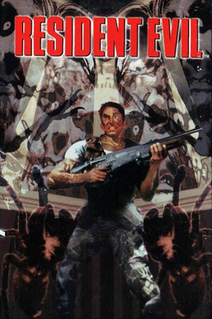 W
WResident Evil is a survival horror video game developed and released by Capcom originally for the PlayStation in 1996, and is the first game in the Resident Evil series. The game's plot follows Chris Redfield and Jill Valentine, members of an elite task force known as S.T.A.R.S., as they investigate the outskirts of Raccoon City following the disappearance of their team members. They soon become trapped in a mansion infested with zombies and other monsters. The player, having selected to play as Chris or Jill at the start of the game, must explore the mansion to uncover its secrets.
 W
WRoad Rash is a 1991 racing and vehicular combat video game originally developed and published by Electronic Arts (EA) for the Sega Genesis. It was subsequently ported to a variety of contemporary systems by differing companies. The game is centered around a series of road races throughout California that the player must win to advance to higher-difficulty races, while using a combination of fisticuffs and blunt weaponry to hinder the other racers.
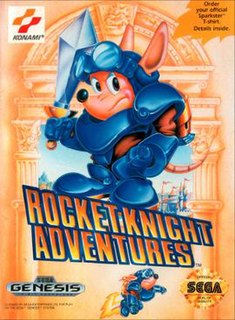 W
WRocket Knight Adventures is a 1993 platform game developed and published by Konami for the Sega Genesis. It was released in North America on August 5, 1993, in Japan on August 6, 1993, and in Europe in 1993. Rocket Knight Adventures was designed by Nobuya Nakazato, designer of Contra games such as The Alien Wars, Hard Corps and Shattered Soldier.
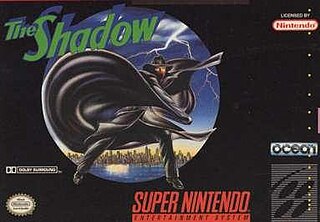 W
WThe Shadow is a video game based on the 1994 Universal film of the same name. It was planned for release in 1994 on the Super NES, alongside other systems, but was canceled.
 W
WSocks the Cat Rocks the Hill is a platform video game developed by Realtime Associates for the Super Nintendo Entertainment System. The game stars Socks, the real-life presidential pet of the Clinton family during Bill Clinton's tenure in office. Originally scheduled for release in the fall of 1993, Socks the Cat experienced delays until it was ultimately canceled due to the closure of publisher Kaneko's U.S. branch in the summer of 1994. The game was complete, however, and review copies were still distributed to gaming publications. A prototype cartridge of the SNES version eventually entered the hands of private collectors, and a Kickstarter campaign to fund a relaunch of the game was started. The campaign was successfully funded and the game originally anticipated a July 2017 release, but it was delayed until February 1, 2018. Its ROM image was soon released to the public.
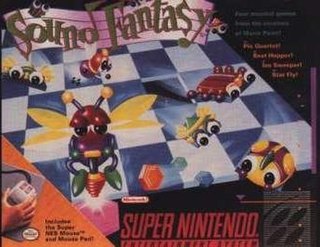 W
WSound Fantasy , titled Sound Factory during development, is an unreleased video game for the Super NES/Super Famicom. Designer Toshio Iwai was inspired by his earlier interactive installation art piece titled Music Insects, to develop a video game at Nintendo between 1993 and late 1994. The completed product was never released by Nintendo, and the game's key elements were later developed into Maxis's 1996 PC game SimTunes.
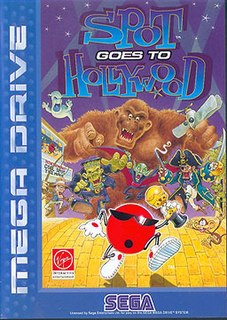 W
WSpot Goes to Hollywood is a platforming video game developed by Eurocom and published by Acclaim Entertainment in North America and Virgin Interactive Entertainment in Europe for the Mega Drive/Genesis as the sequel to Cool Spot. A Sega Saturn and PlayStation version was later released, and featured FMV clips and different levels but similar gameplay to the original version. Sega 32X and SNES versions were also in development but were cancelled before release. It utilizes an isometric graphics system to provide a pseudo-3D playing experience. The player controls Spot, once the mascot for the 7 Up soft drink, as he travels to various places trying to free his friends.
 W
WSuperman is a video game released by Sunsoft for the Mega Drive/Genesis in 1992. It is based on the DC Comics character of the same name. It is a traditional single-player side-scrolling arcade game where the player controls Superman through various levels in an effort to defeat the evil supervillain named Brainiac. Other super villains, as bosses, include The Prankster, Metallo and Mister Mxyzptlk.
 W
WSurvival Arts is a 1993 fighting arcade game developed by Scarab and published by Sammy. It uses digitized images of real actors with blood and gore, similar to Midway's arcade hit Mortal Kombat.
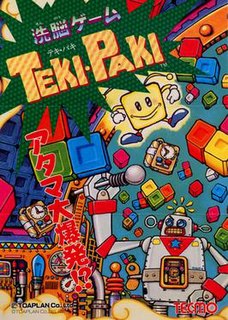 W
WTeki Paki is a 1991 puzzle arcade video game developed by Toaplan and published in Japan by Tecmo, Hong Kong by Honest Trading Co. and Taiwan by Spacy Co. Ltd. It is notable for being one of the few titles by Toaplan that has not received any official port to home consoles as of date.
 W
WWing Commander II: Vengeance of the Kilrathi is the first sequel in Chris Roberts' Wing Commander science fiction space combat simulator franchise of computer games, produced by Origin Systems.
 W
WXenon 2: Megablast is a 1989 shoot 'em up video game developed by The Bitmap Brothers and published by Image Works for the Amiga and Atari ST. It was later converted to the Master System, Mega Drive, Commodore CDTV, Game Boy, Acorn Archimedes and Atari Jaguar platforms. The game is a sequel to Xenon and takes place a millennium after the previous title. The goal of the game is to destroy a series of bombs planted throughout history by the Xenites, the vengeful antagonists of the first game.